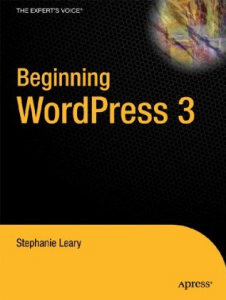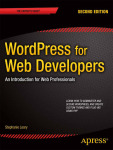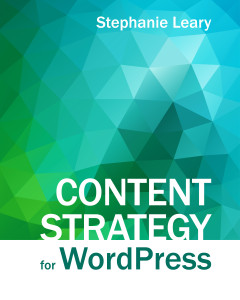These are just a few of the projects I did as part of the University of Washington iSchool‘s MLIS program. Feel free to contact me for more details or reading lists related to any of these projects.
Capstone: FictionFilters.org
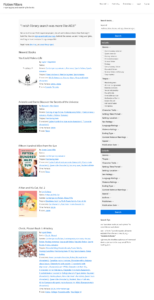 For my capstone team project, I built a crowdsourced tagging site for novels. Using a tag wrangling process and dual include/exclude search interface inspired by the Archive of Our Own, we demonstrated how curating user-submitted tags into a detailed controlled vocabulary could improve library metadata, search, and discovery for fiction. This workflow could be applied to any domain where it is difficult for catalogers to supply the metadata necessary to meet users’ search needs.
For my capstone team project, I built a crowdsourced tagging site for novels. Using a tag wrangling process and dual include/exclude search interface inspired by the Archive of Our Own, we demonstrated how curating user-submitted tags into a detailed controlled vocabulary could improve library metadata, search, and discovery for fiction. This workflow could be applied to any domain where it is difficult for catalogers to supply the metadata necessary to meet users’ search needs.
Read more at fictionfilters.org →
Text Mining for Intertextual Relationships
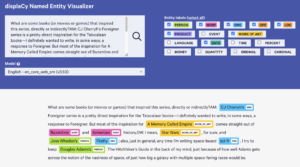 In early 2022, I did an independent study project to demonstrate how text mining methods could be used to glean bibliographic relationships from book reviews and author interviews. The ultimate goal would be to incorporate these relationships into catalog records so that searchers could trace links of inspiration and allusion in fiction in the same way they do citation chains in academic publications.
In early 2022, I did an independent study project to demonstrate how text mining methods could be used to glean bibliographic relationships from book reviews and author interviews. The ultimate goal would be to incorporate these relationships into catalog records so that searchers could trace links of inspiration and allusion in fiction in the same way they do citation chains in academic publications.
More on the text mining project→
Patron Surveys: Finding LGBTQIA+ Materials
As a first year research methods project, in late 2019 my team surveyed library patrons to learn how they find materials on LGBTQIA+ topics, particularly fiction. We confirmed our hypothesis: they don’t. Everyone we surveyed came to the library to search for specific titles and authors based on lists they’d compiled using social reading sites, bookstore searches, and recommendations from friends.
How users find LGBTQIA+ materials in libraries on YouTube → presentation PDF
Fiction Classification
For the seminar on classification theory in early 2021, I put together a sequence of three presentations on the Library of Congress Genre/Form Terms vocabulary, with a close look at the terms for literature. These contain some overlap to reestablish context, as they were given several weeks apart.
- Introduction to LCGFT and the history of fiction classification schemes
- Detailed look at elements of taxonomy design in LCGFT
- Overview of LCGFT design, history, and my recommendations for future changes
Reader’s Advisory
For the Reader’s Advisory course, I did a short Book Blitz & Hand Sell video: a combined video for a two-part assignment in spring 2021. It includes three book recommendations linked by a common theme, followed by recommended readalikes for Cat Sebastian.
More on the Book Blitz project → Cat Sebastian readalikes →
Data Privacy and Location Sharing
For the Information Ownership and Control class in spring 2022, I did a short video on the data privacy implications of widespread use of fitness wearables with location sharing apps.
Data privacy & wearables on YouTube →
Section 230, FOSTA/SESTA, User-Generated Content, and Promoting Self-Published Romances
Also for Information Ownership and Control, I researched Section 230, FOSTA/SESTA, and other proposed amendments to laws regarding censorship and the moderation of user-generated content. Using the hypothetical scenario of a romance community site hosted by a publisher, my team argued that self-published novels are functionally equivalent to other kinds of user-generated content. Since any website promoting them would have to police uploaded cover art and author-provided book descriptions according to the same restrictive guidelines that make it difficult to promote adult content on Tumblr, Facebook, and in Amazon ads, we argued that our hypothetical publisher should lend its weight to lobbying for the repeal of FOSTA/SESTA.
Technology Core Curriculum Review
As a summer fieldwork project, in Summer 2021 classmate Gina Rome and I conducted a review of the MLIS program’s six technology core courses. We surveyed current and former students and industry partners to learn what technical skills are in demand for new graduates and whether the iSchool’s courses are meeting those needs. In addition to our report on the survey data, I put together recommendations for incorporating social/ethical topics into the tech courses.
Our review prompted a number of changes to the tech courses, and subsequent student teams are working on more targeted alumni surveys and further resources for the MLIS advising team.
For this review and other advocacy work I did as an online representative to the student government, I received the 21st Century Award at our graduation ceremony in June 2022.
